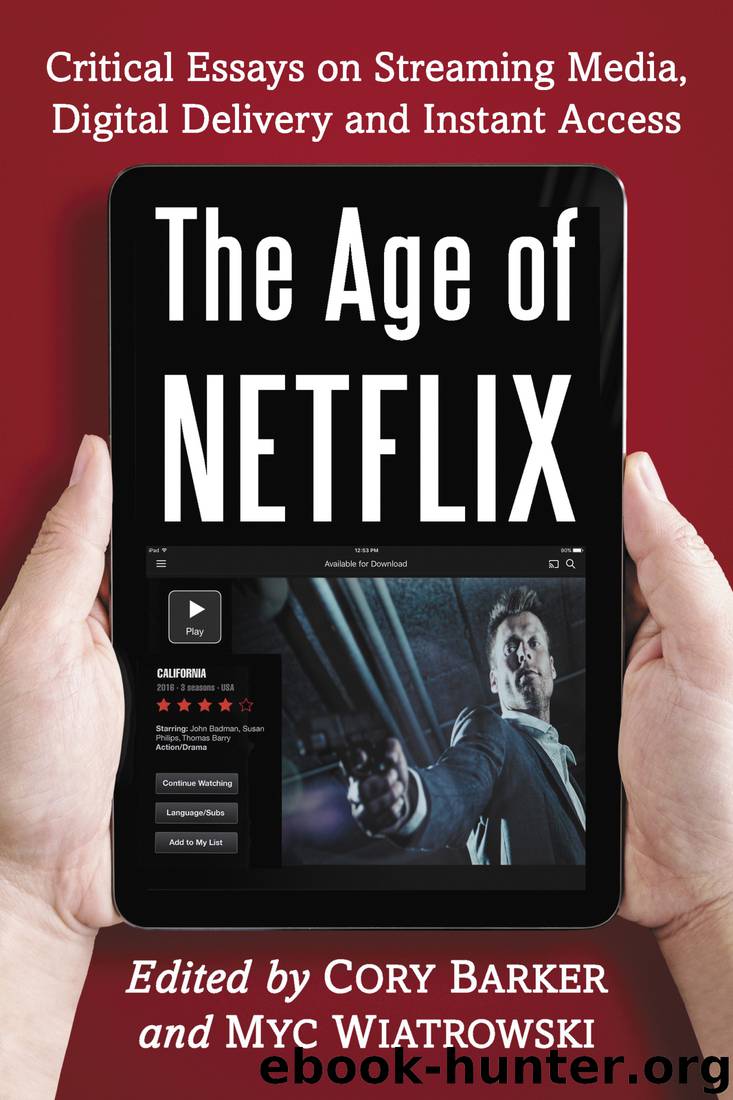The Age of Netflix by Cory Barker

Author:Cory Barker [Barker, Cory]
Language: eng
Format: epub
Publisher: McFarland
Published: 2017-08-24T04:00:00+00:00
The Square in the Rectangle
As it has acquired social and political documentaries, Netflix increasingly functions as an archive that can spread socially progressive political ideologies. Tryon’s work thinks both about digital deliveries and circulations of media writ large as well as Netflix as a specific entity bound up in the wider web of cultural engagement digital circulation engenders. As he argues, digital delivery is both a promise of “ubiquitous access,” but also instills a more individualized mode of consumption, where film-going in particular loses its social import.52 Tryon introduces “platform mobility” and “resistant mobilities” as two disparate ways to understand how texts circulate in digital space. In platform mobility, “it’s not just texts that circulate. So do screens,” and viewers can seamlessly “move” media across devices, creating an “individualized, fragmented, and empowered media consumer” who makes her own pathways through the media she selects.53 While Tryon’s discussion of platform mobility nuances the relationship between online and offline spaces—especially as online media can “move” through or inhabit increasingly more offline spaces—he importantly considers systemic constraints barring how users can consume texts. For instance, geo-blocking, where texts are available on Netflix in one country but not another, leads to alternative methods of cultivation and consumption, where users must use extralegal measures to acquire content. Tryon defines these as “resistant mobilities,” or “activities that defy the practices promoted by the entertainment industry.”54 The problems of geo-blocking are crucial to understanding the circulation of The Square; although “it’s been released in more than 40 other countries, it did not receive distribution in Egypt until June 2014, nearly half a year after its US Netflix debut.”55 Much as Tryon talks about “resistant mobilities” in individual as opposed to communal terms, larger media entities—in this case, YouTube—have stepped in on behalf of The Square and allowed it to circulate digitally. The film received “an exclusive YouTube release in its home country of Egypt, despite not yet being approved by official censors.”56 YouTube, in turn, geo-blocked the film for every country except Egypt to encourage others to view it through Netflix. Here, geo-blocking and resistant mobilities work together to create access and circulation that make the media more widely accessible.
The other major wrinkle to these practices is the very emergence of algorithmic culture itself, where Netflix recommends and acquires certain kinds of movies based on user preference and accrued data about viewing and rating habits. As Blake Hallinan and Ted Striphas have argued, Netflix’s recommendation system points to “a court of algorithmic appeal in which objects, ideas, and practices are heard, cross-examined, and judged independently, in part, of human beings.”57 Their suggestion is an important one, for it signals that the curation and promotion of certain kinds of material to certain kinds of individuals with matching taste profiles. In this model, the promotion of The Square becomes less about raising consciousness across demographics than reinforcing certain sociopolitical ideologies held across certain demographics of Netflix consumers.58
At this juncture, I turn to the text of The Square to think
Download
This site does not store any files on its server. We only index and link to content provided by other sites. Please contact the content providers to delete copyright contents if any and email us, we'll remove relevant links or contents immediately.
| Anthropology | Archaeology |
| Philosophy | Politics & Government |
| Social Sciences | Sociology |
| Women's Studies |
Cecilia; Or, Memoirs of an Heiress — Volume 1 by Fanny Burney(32543)
Cecilia; Or, Memoirs of an Heiress — Volume 2 by Fanny Burney(31939)
Cecilia; Or, Memoirs of an Heiress — Volume 3 by Fanny Burney(31928)
The Great Music City by Andrea Baker(31915)
We're Going to Need More Wine by Gabrielle Union(19032)
All the Missing Girls by Megan Miranda(15936)
Pimp by Iceberg Slim(14481)
Bombshells: Glamour Girls of a Lifetime by Sullivan Steve(14046)
For the Love of Europe by Rick Steves(13885)
Talking to Strangers by Malcolm Gladwell(13344)
Norse Mythology by Gaiman Neil(13343)
Fifty Shades Freed by E L James(13230)
Mindhunter: Inside the FBI's Elite Serial Crime Unit by John E. Douglas & Mark Olshaker(9313)
Crazy Rich Asians by Kevin Kwan(9274)
The Lost Art of Listening by Michael P. Nichols(7487)
Enlightenment Now: The Case for Reason, Science, Humanism, and Progress by Steven Pinker(7305)
The Four Agreements by Don Miguel Ruiz(6744)
Bad Blood by John Carreyrou(6610)
Weapons of Math Destruction by Cathy O'Neil(6261)
